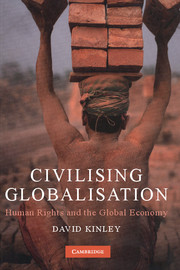3 - Aid and human rights
Published online by Cambridge University Press: 05 June 2012
Summary
Introduction
The relationship between human rights and economic aid is fundamentally different from that which human rights have with trade and with commerce, even if the problems of conceptual tension and institutional practice and culture turn out to be somewhat similar. Aid's raison d'être to alleviate poverty by promoting economic and social development is more directly focused on achieving human rights goals. With the trade or commerce components of the global economy, human rights are seen as possible derivative beneficiaries of the principal concerns of trade liberalisation and commercial enterprise.
Development thinking has, at least in certain quarters, always seen the relevance and importance of human rights. When the UN Economic and Social Council was established under the UN Charter it had functions and powers that related equally to ‘international economic, social, cultural, educational, [and] health matters’, and to ‘promoting respect for, and observance of, human rights and fundamental freedoms for all’ (Article 62). The very essence of what development means to the individual was initially captured in Article 25 of the UDHR 1948, which states that:
Everyone has the right to a standard of living adequate for the health and well-being of himself and of his family, including food, clothing, housing and medical care and necessary social services, and the right to security in the event of unemployment, sickness, disability, widowhood, old age or other lack of livelihood in circumstances beyond his control.
- Type
- Chapter
- Information
- Civilising GlobalisationHuman Rights and the Global Economy, pp. 93 - 144Publisher: Cambridge University PressPrint publication year: 2009



